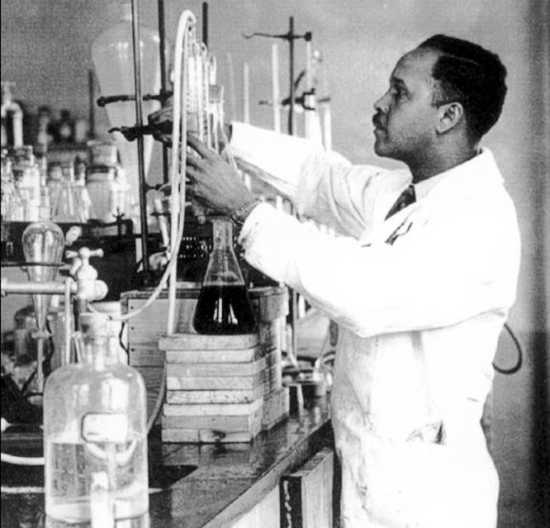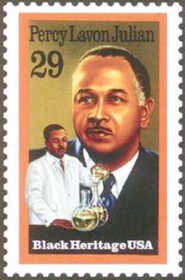Article calls DePauw's Percy Julian 'unsung hero' of black history

At DePauw University, Percy Lavon Julian stands as one of its most heralded graduates.
His name, synonymous with research and lab work, adorns the university's science center.
In Greencastle, the street that runs past both the high school and middle school is known as Percy Julian Drive.

While the name is well known, the story of his life is one worth revisiting. And the website Biography.com has done just that this week.
"As a chemist, Dr. Percy Julian did amazing things," begins an article at Biography.com. "Countless people benefited from his work, from patients with rheumatoid arthritis to servicemen whose lives were saved during World War II. But Julian -- the grandson of slaves -- had to confront numerous challenges in order to have a career in chemistry. His determination and his desire to help others are just as amazing as his achievements in chemistry."
The piece, which includes a photo of Dr. Julian -- a 1920 graduate of DePauw -- from the university's archives, notes, "He was DePauw University's valedictorian in 1920, but at the time no African-American student, no matter how gifted, was expected to pursue higher education."
After graduating from DePauw, Julian earned a master's degree at Harvard and the Ph.D. at the University of Vienna.
The article by Sara Kettler notes how Dr. Julian's post-graduate work as a research fellow at DePauw's Minshall Laboratory led to the synthesis of physostigmine. His research resulted in the development of a synthetic drug for the treatment of glaucoma, as well as a low-cost method of producing cortisone, and a fire-fighting foam that saved thousands of lives during World War II.
The article calls Julian one of the "unsung heroes" of black history.
"Julian confronted racism, inequality and numerous challenges to become one of the most influential chemists in American history," it states.
It also quotes Dr. Julian as saying, "I have had one goal in my life, that of playing some role in making life a little easier for the persons who come after me."
The founder of research laboratories in the United States, Mexico and Guatemala, Julian was a member of DPU's Board of Trustees and was the first recipient of its McNaughton Medal for meritorious public service. He also received an honorary degree from his alma mater in 1947.
He died April 19, 1975 in Waukegan, Ill. The university's Percy Lavon Julian Science and Mathematics Center -- where a bust of Dr. Julian greets visitors -- stands as a tribute to the great chemist.
Elected to the National Academy of Sciences in 1973, Julian received 19 honorary doctorates and in 1990 was inducted into the National Inventors Hall of Fame.
In 1993, the U.S. Postal Service issued a stamp in Dr. Julian's honor, a project shepherded by DePauw's Donald J. "Jack" Cook, the late longtime chemistry professor who worked tirelessly to make the world better aware of Julian's contributions to science.
Few people in Julian's life encouraged him to follow his dream of becoming a chemist, the article notes. One school basically told Julian's professor: "Discourage your bright colored lad. We couldn't get him a job when he's done, and it'll only mean frustration. Why don't you find him a teaching job in a Negro college in the South? He doesn't need a Ph.D. for that."
Julian's father had always supported his son's education, but even he questioned if chemistry was the right career path. As Julian's younger brother, Emerson, later explained, "Dad never wanted us to work for anyone and chemistry was a field which, back in those days, was pretty much barred to our people as a rule -- except for teaching positions at all-black schools. He figured the wisest thing for Percy to do was prepare himself for medicine and set up practice. It was a means of independence."
For a while it looked like his father had accurately assessed Julian's situation, as his son ended up teaching at Fisk University. But then Julian found his way to Harvard, where he got his master's in chemistry in 1923. Unfortunately, Julian encountered racist resistance there as well; denied a teaching assistantship, he still couldn't pursue his Ph.D.
It wasn't until 1929 that Julian was able to start on his doctorate at the University of Vienna in Austria.
In the early 1930s, Julian, along with research partner Josef Pikl, undertook the challenging synthesis of physostigmine. It was a daring move because one of the world's most respected chemists -- Sir Robert Robinson of Oxford University -- was also working on synthesizing the alkaloid.
For Julian, this synthesis wouldn't just be a remarkable achievement, it would rescue his career. He'd returned to a post at Howard University after getting his Ph.D., but when letters containing details of his dating life in Vienna and uncensored thoughts about his colleagues became public, followed by an accusation he'd been having an affair with the wife of his laboratory assistant, Julian had been forced to resign.
He was lucky to find work as a research fellow at DePauw, but it was a temporary position.
Given Julian's career difficulties, it was devastating when Robinson's researchers reported that they'd succeeded in a complete synthesis. Then Julian realized Robinson's work contained a mistake.
Pikl was worried about declaring this publicly, as their careers would be destroyed if Julian turned out to be wrong. But Julian was sure he was right, and wrote an addendum saying so.
Fortunately for Julian -- and for glaucoma patients, who were treated with physostigmine -- his own steps for synthesizing the molecule were shown to be correct in 1935. Not only had he achieved a chemical breakthrough, Julian had left a more celebrated chemist in the dust.
Synthesizing physostigmine was a milestone in chemistry. Julian had done the research at DePauw, and could rightly expect to be appointed as a professor there. However, as he would later note, he "had every qualification except the right colored skin."
Needing a permanent job, Julian turned his attention to private industry. Though many companies balked at the idea of engaging a black scientist, he was hired by the Glidden Co. in 1936, where he would head research for the Soya Products Division.
His work with soybeans led Julian to success after success, and patent after patent. Among his notable achievements was a key protein for Aero-Foam -- nicknamed "bean soup" -- a fire retardant that saved many lives. Julian also came up with methods for synthesizing testosterone and progesterone, as well as an affordable way to produce the steroid cortisone (which was in demand as a treatment for rheumatoid arthritis).
Julian had an additional accomplishment: Open-minded hiring practices. As he explained in a 1947 interview, "We have a mixture of races and religions and we work together and get along. If American democracy won't work anywhere else, we are determined to make it work here in our laboratory."
His scientific breakthroughs alone accomplished that. But Julian also wanted life to improve for African Americans. Though he did not agree with the tactics of every civil rights leader, Julian became a supporter of the movement. By 1967, he was raising funds for the NAACP so that it could continue its fight for equality.
Julian may have believed "that my own good country robbed me of the chance for some of the great experiences that I would have liked to live through . . . I have been, perhaps, a good chemist, but not the chemist that I dreamed of being."
However, his actions would help ensure that other talented African Americans faced fewer obstacles in the future.
